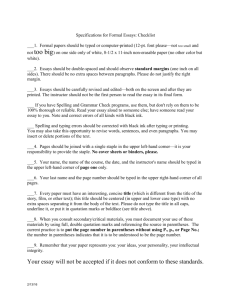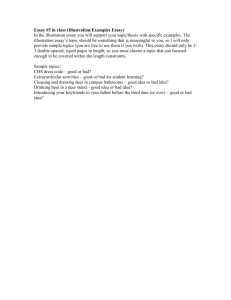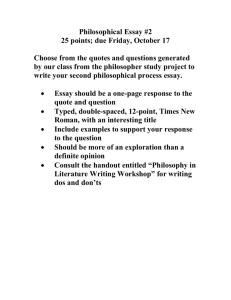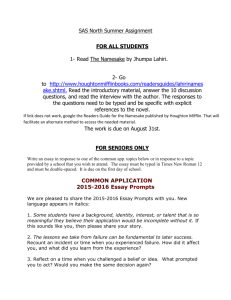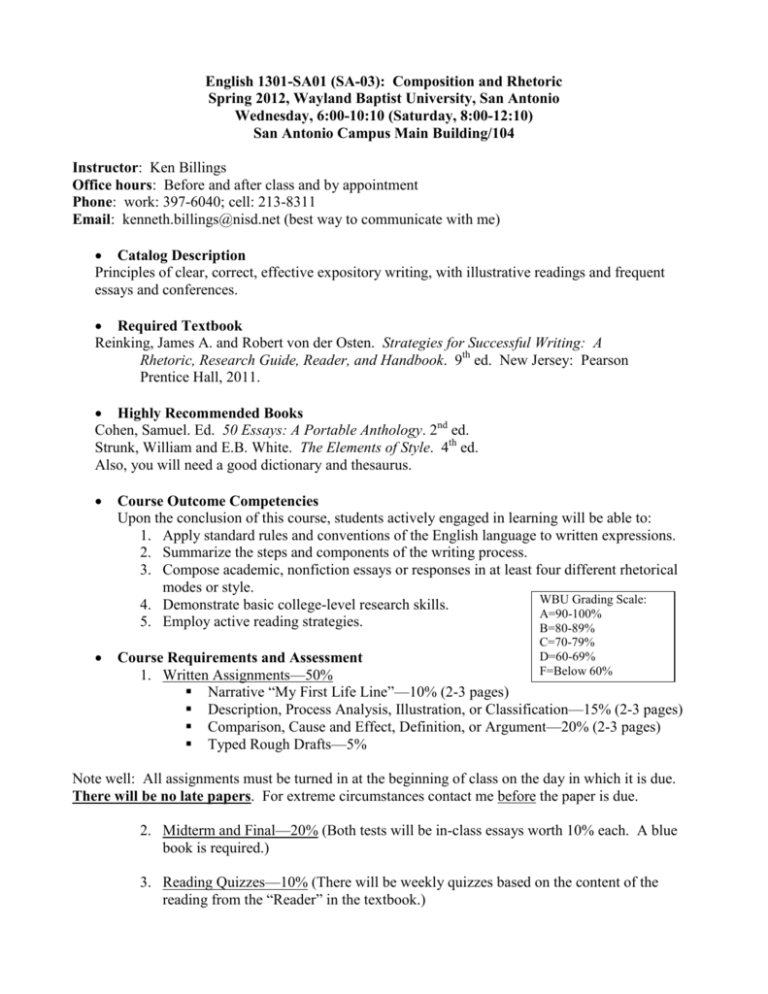
English 1301-SA01 (SA-03): Composition and Rhetoric
Spring 2012, Wayland Baptist University, San Antonio
Wednesday, 6:00-10:10 (Saturday, 8:00-12:10)
San Antonio Campus Main Building/104
Instructor: Ken Billings
Office hours: Before and after class and by appointment
Phone: work: 397-6040; cell: 213-8311
Email: kenneth.billings@nisd.net (best way to communicate with me)
Catalog Description
Principles of clear, correct, effective expository writing, with illustrative readings and frequent
essays and conferences.
Required Textbook
Reinking, James A. and Robert von der Osten. Strategies for Successful Writing: A
Rhetoric, Research Guide, Reader, and Handbook. 9th ed. New Jersey: Pearson
Prentice Hall, 2011.
Highly Recommended Books
Cohen, Samuel. Ed. 50 Essays: A Portable Anthology. 2nd ed.
Strunk, William and E.B. White. The Elements of Style. 4th ed.
Also, you will need a good dictionary and thesaurus.
Course Outcome Competencies
Upon the conclusion of this course, students actively engaged in learning will be able to:
1. Apply standard rules and conventions of the English language to written expressions.
2. Summarize the steps and components of the writing process.
3. Compose academic, nonfiction essays or responses in at least four different rhetorical
modes or style.
WBU Grading Scale:
4. Demonstrate basic college-level research skills.
A=90-100%
5. Employ active reading strategies.
B=80-89%
C=70-79%
D=60-69%
F=Below 60%
Course Requirements and Assessment
1. Written Assignments—50%
Narrative “My First Life Line”—10% (2-3 pages)
Description, Process Analysis, Illustration, or Classification—15% (2-3 pages)
Comparison, Cause and Effect, Definition, or Argument—20% (2-3 pages)
Typed Rough Drafts—5%
Note well: All assignments must be turned in at the beginning of class on the day in which it is due.
There will be no late papers. For extreme circumstances contact me before the paper is due.
2. Midterm and Final—20% (Both tests will be in-class essays worth 10% each. A blue
book is required.)
3. Reading Quizzes—10% (There will be weekly quizzes based on the content of the
reading from the “Reader” in the textbook.)
4. Journals—10% (At the beginning of each class, there will be a journal that will be
collected at the end of the course. There will be a total of ten journal entries.)
5. Attendance and Participation—10%
Attendance Requirements: As stated in the Wayland Catalog, students enrolled at one of the
University’s external campuses should make every effort to attend all class meetings. All absences
must be explained to the instructor, who will then determine whether the omitted work may be made
up. When a student reaches that number of absences considered by the instructor to be excessive, the
instructor will so advise the student and file an unsatisfactory progress report with the campus dean.
Any student who misses 25 percent or more of the regularly scheduled class meetings will receive a
grade of F in the course. Additional attendance policies for each course, as defined by the instructor in
the course syllabus, are considered a part of the University’s attendance policy.
Note well:
-- Do not assume that you can miss as much as 25% of the class and still suffer no
consequences.
-- There are no excused absences: an absence in an absence regardless of reason.
-- Part of being in class is participating: there will be ample opportunity for every student to
read, comment, question, and discuss in the class. This is expected and required.
Academic Honesty: Plagiarism—copying another’s words or ideas and presenting them as
your own—is cheating, a serious academic offense that will result, in the very least, in an F on
the work in question. More serious consequences, such as failure for the class, should be
expected.
Disability Statement: It is University policy that no otherwise qualified disabled person be
excluded from participation in, be denied the benefits of, or be subject to discrimination under
any educational program or activity in the University. Students should inform the instructor of
existing disabilities at the first class meeting. (Documentation of disability may be required.)
English tutoring every Saturday, 10-2, in student lounge/computer room.
Back up all your work.
You will lose it.
And losing it is not an excuse!
Tentative Class Schedule
Week 1: 22 (25) February: Introduction, review syllabus, Journal #1, peer interviewing and writing.
“My First Life Line” handout. Sample essay: “Shooting an Elephant.”
Week 2: 29 February (March 3): Read Chapter 8 (136-51), “The Perfect Picture” (459-61), and
“Sound and Fury” (461-63). In class we will read “Momma’s Encounter” (464-67). Journal entry #2
and Quiz #1. Sample essay: “Notes of a Native Son.”
Week 3: 7 (10) March: Read Chapter 9 (152-67), “When the Full Moon Shines Its Magic over
Monument Valley” (472-73), and “Assembly Line Adventure” (474-77); read Chapter 10 (168-81) and
“Fast Track to Perfection” (483-86). In class we will read “Let’s Get Vertical” (488-90). Journal entry
#3 and Quiz #2. Sample essay: “Me Talk Pretty One Day.” Also, bring Part B of the “My First Life
Line” pre-writing.
Week 4: 14 (17) March: Bring 2 typed copies of your narrative essay rough draft to class. Read
Chapter 11 (182-93), “Binge Drinking, A Campus Killer” (496-99), and “Rambos of the Road” (50002); read Chapter 12 (194-209), and “The Men We Carry in Our Minds” (512-14). In class we will
read “The Company Man” (507-08). Journal #4 and Quiz #3. Sample essays: “The Joy of Reading
and Writing: Superman and Me,” ”Learning to Read and Write,” and “Learning to Read.”
Week 5: 21 (24) March: Bring 2 more typed copies of your narrative rough draft. Journal #5.
Catch-up period. Journal #6. Sample essay: “The Ways We Lie.”
Week 6: 28 (31) March: Final draft of your Narrative paper due and Midterm.
Easter Break (April 2-7)
Week 7: 11 (14) April: Bring 2 typed copies of your Description, Process Analysis, Illustration, or
Classification paper to class. Read Chapter 13 (210-23), “Grant and Lee: A Study in Contrasts” (52628), and “Conversational Ballgames” (529-31); read Chapter 14 (224-39) and “Why We Keep Stuff”
(548-50). Journal #7 and Quiz #4.
Week 8: 18 (21) April: Bring 2 more typed copies of your Description, Process Analysis,
Illustration, or Classification paper to class. Read Chapter 15 (240-55) and “The Sweet Smell of
Success Isn’t All That Sweet” (559-60); read Chapter 16 (256-91), “The Case for Amnesty” (595-99),
and “No Amnesty but Attrition” (600-04). Journal #8 and Quiz #5. Sample essay: “The Insufficiency
of Honesty.”
Week 9: 25 (28) April: Final draft of your Description, Process Analysis, Illustration, or
Classification paper due. Bring 2 typed copies of your Comparison, Cause and Effect, Definition, or
Argument paper to class. Journal #9.
Week 10: 2 (5) May: Bring 2 more typed copies of your Comparison, Cause and Effect, Definition,
or Argument paper to class. Read Chapters 5-7 and do assigned exercises (78-135). Journal #10. All
ten journals due. Sample Essay: “Once More to the Lake.”
Week 11: 9 (12) May: Final draft of your Comparison, Cause and Effect, Definition, or Argument
paper due and Final Exam.

